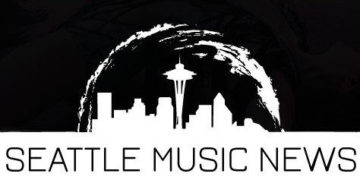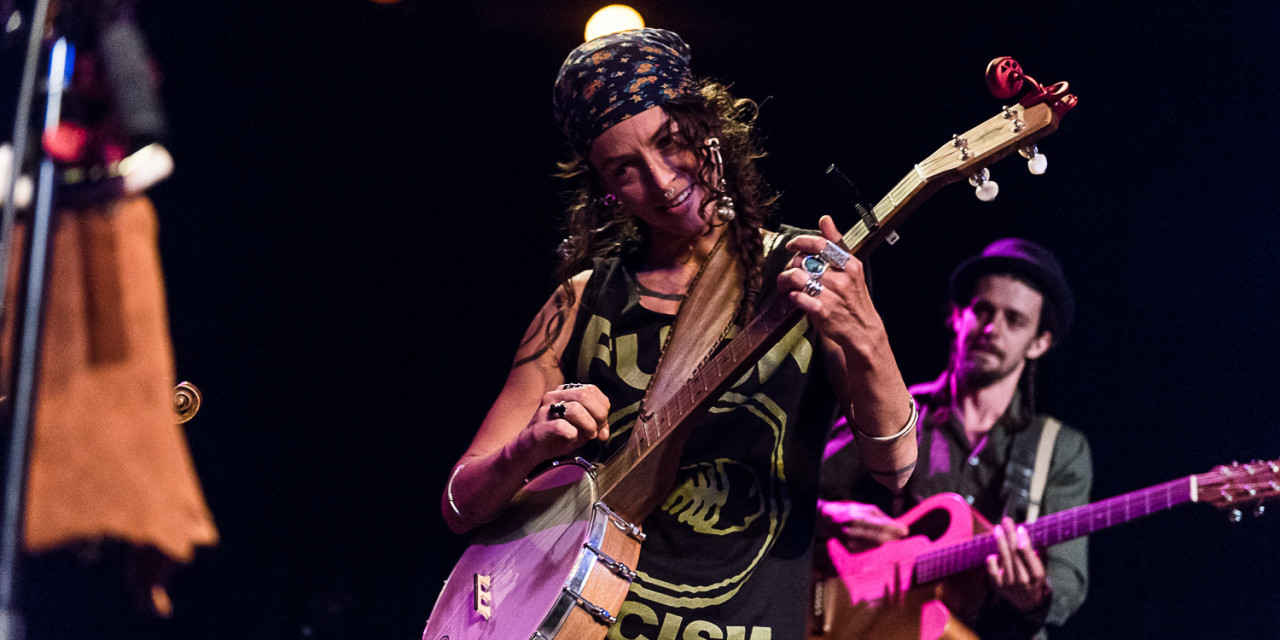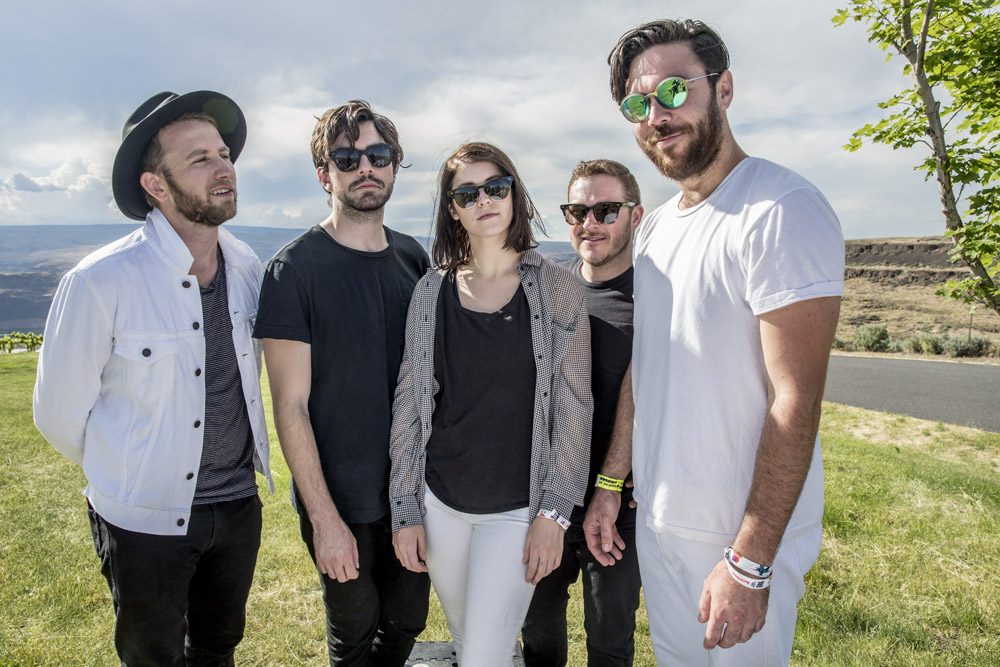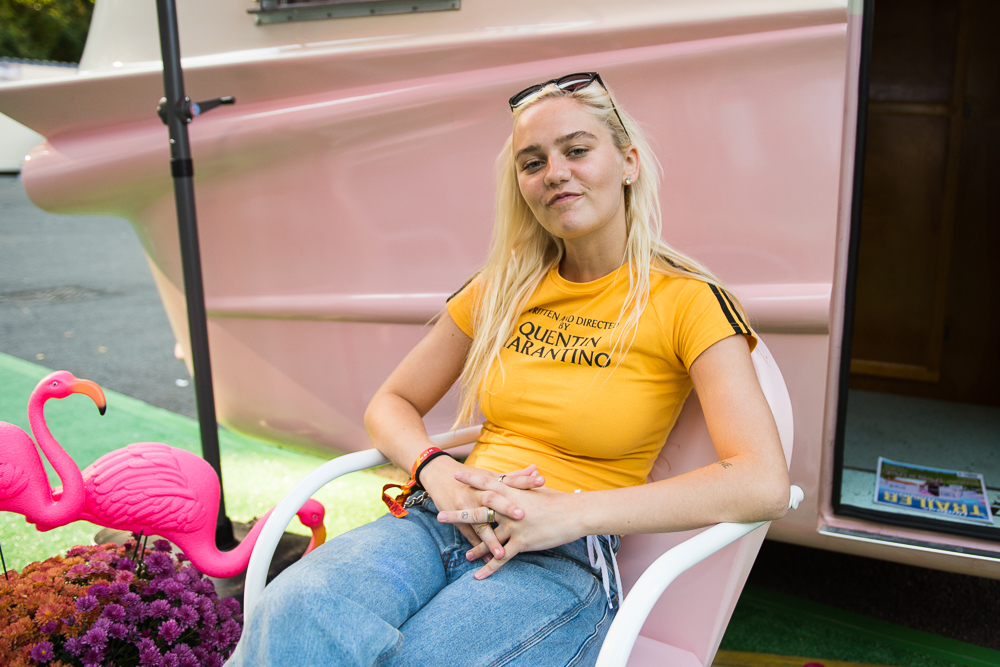Interview: Leah Song of Rising Appalachia
11.09.16
The day before the Seattle stop of their “Resiliency Tour,” we had the opportunity to chat with Leah Song of Rising Appalachia. The band features Leah and her sister Chloe Smith, along with their band of talented musicians. They pull from a variety of genres – bluegrass, folk, reggae, world, and cajun to name a few – to create a sound all their own. And following the recent political happenings, Song had plenty to say about the band, their passions, and their playing.
Seattle Music News: Hi Leah, how are you?
Leah Song: Good, how are you?
SMN: I’m doing great. And you’re in Canada. How’s Canada treating you?
LS: Good, better to be here than there.
SMN: Yes, I think that at least 51% of the country thinks the exact same as you.
LS: Yeah, I think we’re all in a really, probably unhealthy daze at the moment.
SMN: Yeah, it’s kind of bizarro land right now. But we’re not here to talk about that. We’re here to talk about happier things such as your tour and you coming to Seattle.
LS: Yeah, we’ll be there in full regalia.
SMN: So, how is your tour going? How long have you been on the road?
LS: This is the beginning of our fall tour, so we’ve only been out for about a week and we’ve been touring for 12 years so we’re on the road a lot. This is the front end of this Resiliency Tour so we’re well rested and amped up.
SMN: Resiliency, I think that’s going to be a key word throughout the tour.
LS: Yeah, that is. I mean, we knew that the election was going to fall in the middle of the tour. We didn’t know what that would mean, we didn’t know that it would be quite as dismal as it feels right now, but I think for us it was really important to create a space where we’re talking about our own strengths and vitality on the ground and local communities and reminding Americans that, you know, we are resilient people.
SMN: That’s an awesome name for this tour. So after reading through your bio and listening to your music over this past week, I really want to start with the fact that you two originated in New Orleans. Is that correct?
LS: We didn’t, we were raised in Atlanta Georgia, but we did spend about seven years of the early part of our recording project in New Orleans. My sister and I were born and raised in Atlanta, so we have what we call the Southern Trinity now: the urban Atlanta, Georgia concrete jungle, the swamp culture of New Orleans, and the mountain culture of Southern Appalachia. So all three of those are really big pillars in our lives and also in our music.
SMN: And how did spending so many of your early years in New Orleans really influence how you interpret Appalachian music?
LS: Well, you know, I think that even though the name is Rising Appalachia, our intention has always been to create a platform for folk music and southern music and original music and roots music. Learning about the roots of a lot of the southern traditions in the New Orleans style and in the deep south, there are a lot of bridges between the music that comes from the mountains and the music that comes out of the swamp. There’s a lot of the same songs, a lot of the same lyrics, slightly different melodies. There was already a big bridge between the two traditions and it was just really beautiful to have more of a relationship with some of those soul styles. So, both traditions are very much still alive and vibrant.
SMN: Definitely, I mean you pretty much hit the cultural jackpot. I lived in Atlanta for three years and the one thing I loved about living down south was the fact that you had access to so many different subcultures down there too. I mean people say the south, but to be able to go to New Orleans and places like Ashville, and Nashville, and Memphis, and see really different styles, cultures, and sounds, really opened my eyes, because I lived in the Northwest for most of my life. Especially when it came to music, it was almost like a reawakening for me when I lived down there. It was great.
LS: Yeah, the south that we know and we’ve been born and raised into, has been an interesting part of our purpose to share. The south that we know, which is so different from the stereotypical south that we read about, and hear about, and are sort of afraid of even. I mean there’s a lot of deep, rich culture, and tradition, and diversity that very much call the south home.
It’s a big part of the reason our music has still been the forefront of our political justice work cause those stories are not very well told and we’re trying to give them more voice.
SMN: You’re involved in quite a lot besides just your music. I was reading about the Slow Music Movement, the Permaculture Action Network, and RISE. I think what particularly interested me was the RISE Collective and how you brought together different people to perform with you at festivals.
As you’re touring right now and as you know our current climate, what do you believe is the most important message to spread right now?
LS: You know, I think that what we have been doing for the last couple of years has felt like creating momentum and steam around the idea of diversity, empowerment, local empowerment, knowing that big government is not going to work for us. That what is going to work for us is the neighborhoods we live in and the public school systems and creating relationships with the library, and the bartender, and the postman, and the neighborhood grocer. And I think that we’re all really, you know we’re honestly very shell shocked about the way the election has gone, but it seems even more important to identify your local allies and know how to be empowered on the ground and not depending on the government to take care of anything at this point.
So, music is a vehicle for storytelling and I also think it’s a vehicle for connecting people, cultures, neighbors, ages. It really bridges a lot of gaps between all of us. We play fiddle and banjo music so we like to think also that it reaches a whole different demographic that maybe we don’t all agree with each other politically, but we can figure out how to share space together.
SMN: Most definitely. I do see a lot of folk shows that have a greater cross section of our population just there to embrace each other and embrace the themes of the music.
Leah: Right. Right.
SMN: No matter what direction it takes, if you could have one superpower, what would it be?
LS: Right now I think…a superpower…I mean, my God, my answers right now are so incredibly dated by our current standing, you know like I wouldn’t mind forming a militia.
SMN: Okay, just like with the snap of a finger?
LS: Yeah, but I’m not sure that that’s a superpower. Why don’t we stick with something, you know, a little more…
SMN: Comic book?
LS: Comic book, I wouldn’t mind being able to fly.
SMN: Fly? Okay. If you had that power right now, where would you go?
LS: I think I would just hover all around and just keep an eye on what’s going on and what all these small movements are. I think that’s also our purpose you know, we’re fertilizers. We kind of go from community to community, but I’d really like to see from above ground what all of the buzzing is and what’s going on down here on Earth.
SMN: Well, a lot so far. That’s a good one. I like that. Also reading here, there’s a Wikipedia entry about you guys and it described you as playing all these different types of instruments, but also tinky percussive things. How would you describe tinky percussive things?
LS: Well that’s actually my sister.
SMN: Oh, okay.
LS: We built a little apparatus for her with bells, and a beer bottle, and soda caps and she would play them with chopsticks and keys and you know, pieces of a tambourine cymbal and it just created this really fun and very metallic kind of junk station, where it was mostly very light additional percussion.
SMN: When it comes to your music you’ve had 12 years on the road now to see it evolve, see it mature. If you could describe Rising Appalachia’s current iteration in five words, what would it be?
LS: That’s a good question because we have spent so much time trying to break out of genres.
SMN: Sure.
LS: Not even break out of them actually, unify them and create music that touches on a whole multitude of genres.
SMN: Definitely.
LS: I asked that on stage last night, you know, what genre would you put it in.
SMN: I guess it just depends on what song.
LS: Yeah, it’s true. I think our favorite, version of how to describe ourselves is world folk soul. Because we’ve got the folk styles, we’ve got the soul both musically and I think also in the fact that we try to create music that has a spirituality to it, and we use it as bridge builder. We spend a lot of time studying traditions from around the globe so that’s the three liner. The three-word answer. World folk soul.
SMN: And you had two words to spare. You speak about connecting locally with libraries and schools and it sounds like education is something that is very important to you and your sister. How can music education cultivate a more inclusive culture, or the arts in general, in the whole curriculum of what a student should get throughout their life?
LS: Well, I think that our American system has pretty much bellied up on keeping art education in the school system. I think that it’s a very weak link. But I think that the arts and the history of art and the history of the United States is extremely powerful and it’s been, a tool throughout history. Genres of music and of poetry, and the births of different traditions of art have come out of some really intense history of this country. I don’t think you can extract the art from the story of America. I believe that there should be a whole lot more arts education in schools and a whole lot more of it in young people’s live.
I had a very active family and what was neglected in my public schooling, was supplemented by very, very, very active parents who didn’t have a lot of resources and didn’t have a lot of money. But they had a lot of time and were very committed to making sure we had tons, and tons, and tons, and tons, and tons of art in our lives. I mean, in every avenue we were given, I always say we were spoiled creatively, we were not spoiled financially in any way, but we were very spoiled creatively.
And I think that’s once again where the pressure now lies. I don’t know that we can have faith in bigger systems. If it’s not being provided in the schools or in the social settings of young people then parents and neighbors and uncles and cousins and mentors: take it on yourself to bring that into the lives of the young people you know.
SMN: If you could play with one artist, or band, currently alive, who would you play with?
LS: Oh, wow. I’d say there’s a few. I mean one of our most influential artists, she’s not a huge touring artist, and she’s not a household name, but she’s influenced every member of the band and that’s a project called Fat Mama.
I think every one of us is touched by her ability to mix genres and be an orchestra within one voice. That would be very legendary for us. I bet every one of us, the band, would say something different.
SMN: So your whole band is like one big beautiful hodge podge of musical landscape.
LS: Totally one big hodge podge.
SMN: Being on tour for so long I’m sure that you’ve also created certain traditions, maybe before you go on stage, so what is it that you do to get yourself in the moment, in the zone, whatever you want to call it, before you go perform.
LS: We have a lot of rituals that we all incorporate into our day. We have a really brief circle up before we take the stage, but we have other really gentle and consistent practices. We each have our own mindfulness and meditative practices. We try and incorporate a lot of quiet and rest into the early part of our days. We spend a lot of time finding space and resources to cook while we’re on the road so we’re providing our own sustenance and just staying connected to daily rituals, very mundane, but very valuable daily practices of care. That’s a long term part of our touring life. It touches every part of our time on the road.
SMN: What’s your favorite song that you like to perform live?
LS: When I’m feeling very angry… Currently facing our peculiar nation, I take very strongly to the song “Spirit’s Cradle,” which is, I think, about fighting a very broken system. And it has a lot of fire in it. When I’m feeling a little gentler in my day, I love to perform the song “Wider Circles,” because it’s a reminder that we are all interconnected and it presents that in a much more peaceful way. So it really depends on the mood.
SMN: I have one more question: you’re on a ship, it runs ashore and you’re stranded on a desert island. You can only save one album, one book, and one movie, for the rest of your life. What would they be?
LS: I think I would keep Not a Pretty Girl by Annie DeFranco, one of my favorite albums ever. And I would keep a Tom Robbins book, I don’t even know if it matters which one.
SMN: Yeah I don’t think it does.
LS: Yeah you know, just throw a Tom Robbins book in there. It reminds me to be playful and vigilant and hilarious and like adventurous. And, what was the other?
SMN: A movie, please.
LS: A movie.
SMN: Yes, cinematic experience.
LS: You know, I really hardly ever watch movies, so I’m gonna go into my childhood fantasy box and pull out The Labyrinth with David Bowie.
SMN: Classic, love it.
LS: I’m not a movie watcher so my repertoire is pretty meek.
SMN: Well, that is all the questions I have Leah. I really do appreciate the time and enjoy the rest of your time up in Vancouver. We will see you tomorrow night.
LS: Awesome, thanks so much.
(This interview has been edited for length and clarity.)
Interview by Phillip Johnson





